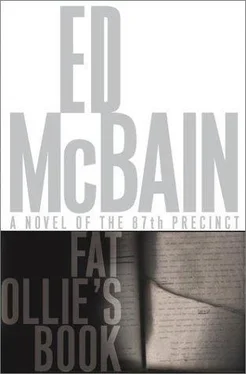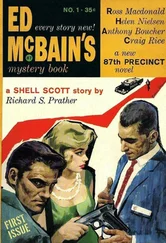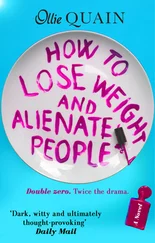Ed McBain - Fat Ollie's Book
Здесь есть возможность читать онлайн «Ed McBain - Fat Ollie's Book» весь текст электронной книги совершенно бесплатно (целиком полную версию без сокращений). В некоторых случаях можно слушать аудио, скачать через торрент в формате fb2 и присутствует краткое содержание. Жанр: Полицейский детектив, на английском языке. Описание произведения, (предисловие) а так же отзывы посетителей доступны на портале библиотеки ЛибКат.
- Название:Fat Ollie's Book
- Автор:
- Жанр:
- Год:неизвестен
- ISBN:нет данных
- Рейтинг книги:4 / 5. Голосов: 1
-
Избранное:Добавить в избранное
- Отзывы:
-
Ваша оценка:
- 80
- 1
- 2
- 3
- 4
- 5
Fat Ollie's Book: краткое содержание, описание и аннотация
Предлагаем к чтению аннотацию, описание, краткое содержание или предисловие (зависит от того, что написал сам автор книги «Fat Ollie's Book»). Если вы не нашли необходимую информацию о книге — напишите в комментариях, мы постараемся отыскать её.
Fat Ollie's Book — читать онлайн бесплатно полную книгу (весь текст) целиком
Ниже представлен текст книги, разбитый по страницам. Система сохранения места последней прочитанной страницы, позволяет с удобством читать онлайн бесплатно книгу «Fat Ollie's Book», без необходимости каждый раз заново искать на чём Вы остановились. Поставьте закладку, и сможете в любой момент перейти на страницу, на которой закончили чтение.
Интервал:
Закладка:
Ed McBain
Fat Ollie’s Book
I realize this is getting boring… But this, too, and yet another time… is for my wife, Dragica Dimitrijevic-Hunter
The city in these pages is imaginary. The people, the places are all fictitious. Only the police routine is based on established investigatory technique.
1
RESPONSE TIME—from the moment someone at the Martin Luther King Memorial Hall dialed 911 to the moment Car 81, in the Eight-Eight’s Boy sector rolled up—was exactly four minutes and twenty-six seconds. Whoever had fired the shots was long gone by then, but a witness outside the Hall had seen someone running from the alleyway on its eastern end and he was eager to tell the police and especially the arriving TV crew all about it.
The witness was very drunk.
In this neighborhood, when you heard shots, you ran. In this neighborhood, if you saw someone running, you knew he wasn’t running to catch a bus. This guy wasn’t running. Instead, he was struggling to keep his balance, wobbling from one foot to the other. Nine, ten in the morning, whatever the hell it was already, and he could hardly stand up and he stunk like a distillery. He finally sat on one of the garbage cans in the alley. Behind him, rain water from a gutter dripped into a leader and flowed into an open sewer grate.
Slurring his words, the drunk immediately told the responding officers from Car 81 that he was a Vietnam vet, mistakenly believing this would guarantee him a measure of respect. The blues saw only a scabby old black drunk wearing tattered fatigue trousers, an olive-drab tank top, and scuffed black penny loafers without socks. He was having trouble not falling off the garbage can, too. Grabbing for the wall, he told them he’d been about to go into the alley here, yessir, when he saw this guy come bustin out of it…
“Turned left on St. Sab’s,” he said, “went runnin off uptown.”
“Why were you going in the alley?” one of the blues asked.
“To look inna garbage cans there.”
“For what?”
“Bottles,” he said. “Takes ’em back for deposit, yessir.”
“And you say you saw somebody running out of the alley here?” the other blue asked. He was wondering why they were wasting time with this old drunk. They’d responded in swift order, but if they wasted any more time with him, their sergeant would think they’d been laggard. Then again, the TV cameras were rolling.
“Came out the alley like a bat out of shit,” the drunk said, much to the dismay of the roving reporter from Channel Four, a pretty blonde wearing a short brown mini and a tan cotton turtleneck sweater. The camera was in tight on the man’s face at that moment, and the word “shit” meant they couldn’t use the shot unless they bleeped it out. Her program manager didn’t like to bleep out too many words because that smacked of censorship instead of fair and balanced reporting. On the other hand, the drunk was great comic relief. The Great Unwashed loved drunks. Put a drunk scene in a movie or a play, the audience still laughed themselves to death. If they only knew how many battered wives Honey had interviewed.
“What’d he look like?” the first blue asked, mindful of the TV cameras and trying to sound like an experienced investigator instead of a rookie who’d just begun patrol duty eight months ago.
“Young dude,” the witness said.
“White, black, Hispanic?” the first blue asked, rapping the words out in a manner that he was sure would go over big with TV audiences, unmindful of the fact that the camera was on the witness and not himself.
“White kid,” the witness said, “yessir. Wearin jeans and a whut chu call it, a ski parka, an’ white sneakers an’ a black cap with a big peak. Man, he was movin fast. Almost knocked me down.”
“Did he have a gun?”
“I dinn see no gun.”
“Gun in his hand, anything like that?”
“No gun, nossir.”
“Okay, thanks,” the first blue said.
“This is Honey Blair,” the Channel Four reporter said, “coming to you from outside King Memorial in Diamondback.” She slit her throat with the forefinger of her left hand, said, “That’s it, boys,” and turned to her crew chief. “Get him to sign a release, will you?” she said. “I’m heading inside.” She was walking toward the glass entrance doors when the Vietnam vet, if indeed that’s what he was, asked, “Is they a reward?”
Why didn’t you say that on the air? Honey thought.
THIS WAS, and is, and always will be the big bad city.
That will never change, Ollie thought. Never.
And never was it badder than during the springtime. Flowers were blooming everywhere, even in the 88th Precinct, which by the way was no rose garden.
Detective/First Grade Oliver Wendell Weeks had good reason to be smiling on this bright April morning. He had just finished his book. Not finishedreadingit, mind you, but finishedwritingit. He was still rereading the last chapter, which was back at the apartment. He didn’t think it would need any more work, but the last chapter was often the most important one, he had learned, and he wanted to make sure it was just right. He was now transporting the positively perfect portion of the book to a copying shop not far from the Eight-Eight.
He wondered if the sun was shining and the flowers were blooming next door in the 87th Precinct. He wondered if it was springtime in the Rockies, or in London, or in Paris or Rome, or in Istanbul, wherever that was. He wondered if flowers bloomed all over theworldwhen a person finished his first work of fiction. Now that he was a bona fide writer in his own mind, Ollie could ponder such deep imponderables.
His book, which was titledReport to the Commissioner,was securely nestled in a dispatch case that rested on the back seat of the car Ollie drove hither and yon around this fair city, one of the perks of being a minion of the law, ah yes. The windows of the Chevy sedan were open wide to the breezes that flowed from river to river. It was 10:30 on a lovely sunlit Monday morning. Ollie had signed in at 7:50 (five minutes late, but who was counting?), had taken care of some odds-and-ends bullshit on his desk, and was now on his way to the copying shop on Culver Avenue, not four blocks from the station house. So far, the day—
“10-40, 10-40…”
The dash radio.
Rapid mobilization.
“King Memorial, St. Sebastian and South Thirtieth, man with a gun. 10-40, 10-40, King Memorial…”
Ollie hit the hammer.
HE PARKED ILLEGALLYat the curb outside the Martin Luther King Memorial Hall, flipped down the visor on the driver’s side to show the card announcing Police Department authorization, locked the car, flashed the blue-and-gold tin at a uniformed grunt who was already approaching with a scowl and an attitude, said, “Weeks, Eighty-eighth Squad,” and barged right past him and the roaming television teams that were already thrusting microphones at anyone within range. He kept using his detective’s shield like a real warrior’s shield, holding it up to any barbarian who rose in his path, striding through the glass doors at the front of the building, and then into the marble entrance lobby, and then into the auditorium itself, where a handful of brass were already on the scene, had to be something important went down here.
“Well, well, if it isn’t The Large Man,” a voice said.
Once upon a time, Ollie’s sister Isabelle had referred to him as “large,” which he knew was a euphonium for “obese.” He had not taken it kindly. In fact, he had not bought her a birthday present that year. Ollie knew that there were colleagues in this city who called him “Fat Ollie,” but he took it as a measure of respect that they never called him this to his face. “Large Man” came close, though. He was ready to take serious offense when he recognized Detectives Monoghan and Monroe of the Homicide Division, already on the scene, and looking like somewhat stout penguins themselves. So someone had been aced. Big deal. Here in the Eight-Eight, it sometimes felt like someone got murdered every ten seconds. Monoghan was the one who’d called him “The Large Man.” Monroe was standing beside him, grinning as if in agreement. A pair of bookends in black—the color of death, the unofficial color of Homicide—the two jackasses were the Tweedledum and Tweedledee of law enforcement. Ollie wanted to punch them both in the mouth.
Читать дальшеИнтервал:
Закладка:
Похожие книги на «Fat Ollie's Book»
Представляем Вашему вниманию похожие книги на «Fat Ollie's Book» списком для выбора. Мы отобрали схожую по названию и смыслу литературу в надежде предоставить читателям больше вариантов отыскать новые, интересные, ещё непрочитанные произведения.
Обсуждение, отзывы о книге «Fat Ollie's Book» и просто собственные мнения читателей. Оставьте ваши комментарии, напишите, что Вы думаете о произведении, его смысле или главных героях. Укажите что конкретно понравилось, а что нет, и почему Вы так считаете.












